 MyDogBreeds
MyDogBreedsTreeing Tennessee Brindle is originated from United States but Cao de Fila da Terceira is originated from Portugal. Both Treeing Tennessee Brindle and Cao de Fila da Terceira are having almost same height. Treeing Tennessee Brindle may weigh 57 kg / 125 pounds lesser than Cao de Fila da Terceira. Both Treeing Tennessee Brindle and Cao de Fila da Terceira has same life span. Both Treeing Tennessee Brindle and Cao de Fila da Terceira has almost same litter size. Both Treeing Tennessee Brindle and Cao de Fila da Terceira requires Low maintenance.
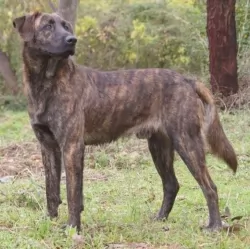 There doesn’t seem to be 100% clarity on how the dog came about but it originated in USA. It appears as though it was only since 1995 that records have been maintained through the American Kennel Club's Foundation Stock Service Program.
There doesn’t seem to be 100% clarity on how the dog came about but it originated in USA. It appears as though it was only since 1995 that records have been maintained through the American Kennel Club's Foundation Stock Service Program.
A Reverend Earl Phillips, who was a writer for a hunting magazine became aware of a Brindle Cur with a brown coat and tiger stripes. In fact ‘treeing’ is a type of hunting, where the dog chases an animal into a tree to escape. He heard about the dog’s amazing hunting skills.
In the early 1960s, he later formed The Treeing Tennessee Brindle Breeders Association, designed to protect the breed. It was in 2013 that the dog got foundation stock status with the American Kennel Club, but isn’t registered with the American Kennel Club.
The Cao de Fila da Terceira Mastiff hails from Portugal and is also known as the Rabo Torto.The dog actually comes from the isle of Terceira in the Azores. The dog descends from mastiffs, bulldogs and local dogs.
It was in the 1960s that there was an attempt to revive the dwindling numbers of the breed. The dog was declared extinct in the 1970s but there were some people in the Azores who wanted to see the breed restored, and it remains a mystery as to if the dog is in fact still available. The breed isn’t recognized by kennel clubs.
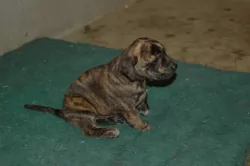 The Treeing Tennessee Brindle is a medium sized, deep chested breed of Cur, descending from the Old Brindle Cur dog.
The Treeing Tennessee Brindle is a medium sized, deep chested breed of Cur, descending from the Old Brindle Cur dog.
These strong dogs have a short, smooth brindle coat that is fairly soft to the touch. The coat's color is a mix of tan, black and a little bit of white.
He stands at between 41 and 61cm in height and weighs between 14 and 23kg both male and female. The Treeing Tennessee Brindle has a loud bark and it is best that this dog lives on a farm or in the suburbs as opposed to living in a small space in the city.
The Treeing Tennessee Brindle is a friendly, social dog and this is why he doesn’t make a particularly good watchdog.
He gets on well with children in the home as well as other dogs, not showing any aggression towards them.
They’re intelligent dogs and it will be a good idea to have them trained and socialized to make them well balanced and well behaved.
The Cao de Fila da Terceira is a medium sized molosser, recognized by his weird tail – short and twirled. In fact, the dog’s other name, Rabo Torto, actually stands for ‘twisted tail’, which is a trademark of this dog and which is thought to come from the mix of bulldog in him.
The dog’s coat is short and smooth and the color is usually fawn or yellow while other colors such as brindle, red or black are also available but less acceptable. You may also find small white markings on the chest and feet.
Standing at about 55cm, the dog is muscular and powerful with a broad head, medium sized floppy ears, wide chest and strong muzzle.
The Cao de Fila da Terceira is a good guard dog and while he doesn’t like strangers, he is a dog who is loving and devoted with his human family. See that he gets socialized and trained and he is capable of establishing a deep relationship with all members of the family, children and other pets included. He relies on his owners to provide him with warmth and communication.
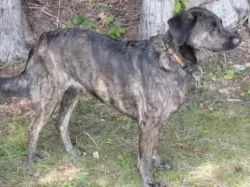 This brindle-colored cur dog is brave, intelligent and lively and his temperament allows him to be a good companion for his human family.
This brindle-colored cur dog is brave, intelligent and lively and his temperament allows him to be a good companion for his human family.
Even though they are friendly around strangers, they still make good watchdogs and will alert you to all kinds of visitors to your property. They do best in a home with large grounds and an active family where they can explore and sniff around. At the end of the day, they love to lie contentedly at your feet, a loyal, loving companion.
If only dog owners would realize that when it comes to a dog’s characteristics, that while there are some traits inherent in a dog, essentially it’s a case of you reap what you sow with a dog. Treat your dog badly, ignore him and abuse him and you get an aggressive, volatile dog who is a threat to the very humans who created the monster in him.
The Cão de Fila da Terceira will certainly need excellent training and socialization, and when he receives plenty of loving attention from his human family he becomes an amazing, relaxed pet. He becomes patient and sweet-tempered so that you can ultimately call him guardian and friend.
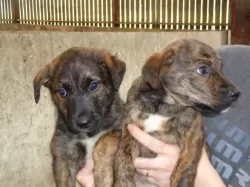 The Treeing Tennessee Brindle is a robust, healthy breed. You’re not likely to battle with too many health issues with him.
The Treeing Tennessee Brindle is a robust, healthy breed. You’re not likely to battle with too many health issues with him.
Watch out for ear infections which are more common in floppy eared dogs. Other common dog diseases that you need to know about -
This is a viral disease which is highly contagious and with no known cure. It’s why there is a vaccine against it. Coughing, lethargy, high temperature and loss of appetite with vomiting are symptoms of this disease.
This is another highly contagious respiratory viral infection transmitted between dogs in close proximity to each other, like in kennels for instance.
Symptoms include coughing, sneezing, nasal discharge, breathing difficulties, lethargy and loss of appetite. It’s important to get veterinary assistance as pneumonia could set in.
The Cão de Fila da Terceira is a healthy dog breed, but even so, you need to be looking out for some ailments which can threaten the comfort and wellbeing of any dog.
This can often be brought about by the wrong diet. When you see your pet battling to clear out the bowels, it can often be rectified by altering your dog’s diet. Speak to your vet if it continues. Your vet may suggest adding some form of nutritious oil to your pet’s diet.
Dogs can also suffer from heart disease, especially when there is an obstruction to the flow of blood to the brain which can cause your pet to collapse. Veterinary attention must be sought without delay.
Frequent passing of water can be indicative of a kidney problem. Veterinary advice will be needed.
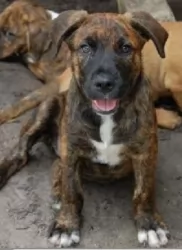 A brush once or twice a week will be sufficient for this dog. Look inside his ears for signs of redness which could indicate an ear infection. Make sure his eyes are still bright and not red and with a pus discharge. Trim his nails too.
A brush once or twice a week will be sufficient for this dog. Look inside his ears for signs of redness which could indicate an ear infection. Make sure his eyes are still bright and not red and with a pus discharge. Trim his nails too.
The Treeing Tennessee Brindle is a high energy dog and he is going o want more than just a walk every day, although he will love that and rely on you for this daily outing.
He will also want ball games and hide and seek games.The breed needs an active owner who will take him on long walks and hikes.
Whenever you opt to give a dog commercially manufactured dog food, you need to check that the dog food is made with high-quality ingredients which are mostly made up of protein or meat.
Certainly a puppy will need protein in his food for proper growth and he will require 4 bowls of food a day. An adult dog will require 2 bowls of food a day.
The type of commercial dog food you buy will depend on the age of your dog as well as his activity levels. If your dog has a known allergy or illness, there are dog foods manufactured with that in mind.
Try and in include some homemade food into his diet. Nothing spicey and exotic as this can cause stomach problems. A good guide is boiled chicken, brown rice and vegetables.
Companionship is important for the Cao de Fila da Terceira, and if you don’t have another dog in the home, as a pack animal, your dog will rely on you for being an active part of his life. A dog that is well treated becomes thoroughly loyal to his owner.
A balanced diet is important for health and for a shiny coat. If you’re unsure of how to feed your Terceira, speak to your veterinarian first. Your vet will know that protein for instance, is essential for your dog. The vet will also speak to you about how to feed a puppy, an adult dog, a pregnant female dog and also feeding your senior dog. Your vet will also explain the hazards of overfeeding and how raw meat also needs to be included in your pet’s diet.
Fresh, cool water is your pet’s life-blood and should be available to your dog night and day. Every dog can benefit too from taking a daily supplement rich in omega-3 fatty acid.
The grooming of your pet will depend on the breed. The Cão de Fila da Terceira has a short coat so he will be easy to maintain. Brush him twice a week to remove loose hairs.
Areas which also need checking daily are the eyes to see that there is no discharge. It is also important to inspect the ears as there should be no build-up of wax inside the ear. Toenails also need attention and should be clipped if they grow long from the pet not walking on hard surfaces.